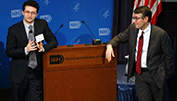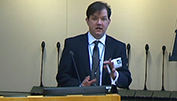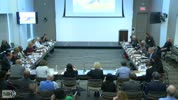-
- NIH VideoCast - Ethics Rounds: Assessing the Risks of Involving Medical Trainees in Patient Care: Should We Conduct Randomized Trials?
-
- - Peter Angelos. MD, PhD, Linda Kohler Anderson Professor of Surgery and Surgical Ethics and Chief, Endocrine Surgery; Associate Director, MacLean Center for Clinical Medical Ethics, University of Chicago Medicine and Case Presenter: Derek Braverman, BA, Yale University and Former Fellow, Bioethics Department and Medical Student, John Hopkins School of Medicine (2018/04/06)
- - Category : Clinical Center Grand Rounds
- Ethics Rounds: Assessing the Risks of Involving Medical Trainees in Patient Care: Should We Conduct Randomized Trials?
For more information go to http://www.cc.nih.gov/about/news/grcurrent.html
NIH VideoCast - Ethics Rounds: Assessing the Risks of Involving Medical Trainees in Patient Care: Should We Conduct Randomized Trials?
-
- NIH VideoCast - Skin resident T cells in human health and disease
-
- - Rachel Clark, MD, PhD, Shing Yu Yip and Cecelia B. Hepp Associate Professor of Dermatology, Harvard Medical School (2018/04/06)
- - Category : Immunology
- Immunology IG Seminar
Dr. Clark attended Caltech as an undergraduate, where she was told to avoid a career in medicine. Despite this excellent advice, she completed the M.D./Ph.D. program at Harvard Medical School and now serves as the Shing-Yiu Yip and Cecilia M. Hepp Associate Professor of Dermatology at Harvard Medical School and the Director of the NIAMS P30 funded Human Skin Disease Resource Center. Her research focuses on the study of human T cell responses in skin and other peripheral tissues, including T cell function in healthy skin, impaired T cell migration and responses in skin cancer, and maladaptive T cell activation in inflammatory skin diseases and cutaneous lymphomas. Her studies, driven by observations in patients and carried out on human tissues, have the goals of developing novel therapies for skin disease and advancing our understanding of human immune responses.
NIH VideoCast - Skin resident T cells in human health and disease
-
- NIH VideoCast - Analysis of RBC Derived Microparticles from Sickle Cell Mice using Mass Spectrometry: The Impact of Sickle Cell Disease Induced Oxidative Stress on MP Proteome
-
- - Michael Brad Strader, Ph.D., FDA (2018/04/06)
- - Category : Proteomics
- Proteomics Interest Group
Polymerization of sickle cell hemoglobin S (HbS) is recognized as a key event in the pathophysiology of sickle cell disease (SCD). Repeated HbS polymerization promotes an altered red blood cell (RBC) membrane, hemolysis, and microparticles (MP) formation, which have been shown to play a significant role in the interaction of RBCs with vascular endothelium and progression of vaso-occlusive events. We have recently reported that free HbS oxidizes faster, remains locked in a highly oxidizing form (ferryl) longer and loses heme faster than normal HbA. The first part of this seminar will focus on the Laboratory of Biochemistry and Vascular Biology???s (LBVB) objectives, strategy and workflow for characterizing the RBC derived microparticle proteomes of SCD and control blood. This seminar, will also focus on proteomic differences between Microparticles derived from wildtype and SCD transgenic mouse models. Finally, we extended this study to characterize the impact of hydroxyurea treatment. The goal of these LBVB studies is to determine the global impact of HbS oxidation on the proteome (relative to wildtype control blood) and to access how hydroxyurea treatment changes the overall proteome associated with SCD. The results from this seminar will ultimately provide new mechanistic insight into molecular details (at the proteome level) of SCD and potential hydroxyurea treatment.
NIH VideoCast - Analysis of RBC Derived Microparticles from Sickle Cell Mice using Mass Spectrometry: The Impact of Sickle Cell Disease Induced Oxidative Stress on MP Proteome
-
- NIH VideoCast - NCI Post-Treatment Surveillance Workshop - March 2018 (Day 2)
-
- - NCI, NIH (2018/04/05)
- - Category : Conferences
- To discuss issues in post treatment surveillance given the current advances in imaging and in vitro diagnostics. Specific discussions will occur in Breast, Colon, NSCLS, Colorectal Cancer and Testicular cancer. Identify and prioritize histologies and tools that are most suitable to be evaluated in this setting, in NCTN and NCORP clinical trials.
NIH VideoCast - NCI Post-Treatment Surveillance Workshop - March 2018 (Day 2)
-
- NIH VideoCast - Reveal and engineer molecular machinery to control synaptic strength in vivo
-
- - Susumu Tomita, Ph.D., Yale University (2018/04/05)
- - Category : Neuroscience
- NIH Neuroscience Series Seminar
Dr. Tomita laboratory???s approach to understand brain is to reduce brain to various components and ultimately molecules. The primary functional component of brain is the neural circuit, which are comprised of anatomical neuronal wiring and synaptic transmission. Temporally, neurotransmission by a major excitatory neurotransmitter in brain, glutamate, is very quick and is clearly essential for brain function; however, the modulation of brain function underlying learning, memory, emotion, cognition, etc., happens on a different time scale than that of neurotransmission. Their broad goal is to understand how basic synaptic transmission can be modulated over seconds to hours, thereby supporting complex brain functions. The efficacy of synaptic transmission is determined by glutamate concentration at the synaptic cleft and by the number and channel properties of the glutamate receptors, which can be modulated by neuronal activation (synaptic plasticity).
It is therefore important to determine how many receptors are at synapses and how strongly these receptors are activated upon glutamate releases. They have uncovered a network of modulatory proteins for glutamate receptors to control their number and properties. By understanding the machinery that controls the number and channel properties of glutamate receptors, they hope to reveal the principal rules governing synaptic transmission and synaptic plasticity. Combined with neuronal wiring mapping, this should help them understand a big picture of neural circuits and the momentary changes that occur in neural circuits to control animal behavior. For more information go to https://neuroscience.nih.gov/neuroseries/Home.aspx
NIH VideoCast - Reveal and engineer molecular machinery to control synaptic strength in vivo
-
- NIH VideoCast - 2018 Demystifying Medicine: Compulsive disorders: mechanisms and management
-
- - Veronica Alvarez, PhD, NIAAA, NIH and Antonello Bonci, MD, NIDA, NIH (2018/04/05)
- - Category : Demystifying Medicine
- The Demystifying Medicine Lecture Series is designed to help bridge the gap between advances in biology and their applications to major human diseases. The lectures include presentations of patients, pathology, diagnosis, and therapy in the context of major diseases and current research. All clinicians, trainees including fellows, medical students, Ph.D. students, and other healthcare and research professionals are welcome to attend.
For more information go to https://demystifyingmedicine.od.nih.gov
NIH VideoCast - 2018 Demystifying Medicine: Compulsive disorders: mechanisms and management
-
- NIH VideoCast - NIH BRAIN Initiative Workshop on Research with Human Neural Tissue
-
- - NIH (2018/04/03)
- - Category : Conferences
- The purpose of the meeting is to assess the state of the science and consider neuroethical issues regarding research with human neural tissue, with the aim of informing how to support this type of research. Information presented and gathered at this meeting will support the development of future plans for the NIH BRAIN Initiative, set to continue until 2025.
NIH VideoCast - NIH BRAIN Initiative Workshop on Research with Human Neural Tissue
-
- NIH VideoCast - All of Us Research Program Scientific Priorities Workshop - March 2018 (Day 2)
-
- - All of Us Research Program, NIH (2018/03/31)
- - Category : Conferences
- All of Us Research Program Scientific Priorities Workshop
NIH VideoCast - All of Us Research Program Scientific Priorities Workshop - March 2018 (Day 2)
-
- NIH VideoCast - All of Us Research Program Scientific Priorities Workshop - March 2018 (Day 3)
-
- - All of Us Research Program, NIH (2018/03/31)
- - Category : Conferences
- All of Us Research Program Scientific Priorities Workshop
NIH VideoCast - All of Us Research Program Scientific Priorities Workshop - March 2018 (Day 3)
-
- NIH VideoCast - 2018 Demystifying Medicine: Amyotrophic Lateral Sclerosis (Lou Gehrig???s Disease): are we making progress?
-
- - Bryan Traynor MD, PhD, MMSc, NIA, NIH and Mary Kay Floeter, MD, PhD, NINDS, NIH (2018/03/31)
- - Category : Demystifying Medicine
- The Demystifying Medicine Lecture Series is designed to help bridge the gap between advances in biology and their applications to major human diseases. The lectures include presentations of patients, pathology, diagnosis, and therapy in the context of major diseases and current research. All clinicians, trainees including fellows, medical students, Ph.D. students, and other healthcare and research professionals are welcome to attend.
For more information go to https://demystifyingmedicine.od.nih.gov
NIH VideoCast - 2018 Demystifying Medicine: Amyotrophic Lateral Sclerosis (Lou Gehrig???s Disease): are we making progress?
-
- NIH VideoCast - NCI Post-Treatment Surveillance Workshop - March 2018 (Day 1)
-
- - NCI, NIH (2018/03/30)
- - Category : Conferences
- To discuss issues in post treatment surveillance given the current advances in imaging and in vitro diagnostics. Specific discussions will occur in Breast, Colon, NSCLS, Colorectal Cancer and Testicular cancer. Identify and prioritize histologies and tools that are most suitable to be evaluated in this setting, in NCTN and NCORP clinical trials.
NIH VideoCast - NCI Post-Treatment Surveillance Workshop - March 2018 (Day 1)
-
- NIH VideoCast - Office of AIDS Research Advisory Council Meeting - March 2018
-
- - NIAID, NIH (2018/03/30)
- - Category : AIDS Research Advisory Committee
- OAR Director???s Report; and, updates on the NIH AIDS Study Sections, the OAR Task Force on Cost-Sharing, the FY2020 Trans-NIH Plan for HIV-Related Research, and on HIV/AIDS research activities from NIH Institutes.
NIH VideoCast - Office of AIDS Research Advisory Council Meeting - March 2018
-
- NIH VideoCast - 2018 IMAG Futures Meeting: Moving Forward with the MSM Consortium
-
- - NIBIB, NIH (2018/03/29)
- - Category : Conferences
- The 2018 IMAG Futures meeting is where consortium plans the future for multiscale modeling and analysis of biomedical, biological and behavioral systems. The 2009 IMAG Futures Meeting was seminal in setting the stage for addressing multiscale modeling challenges that can make an impact on biomedical research through the IMAG Multiscale Modeling (MSM) Consortium. This year???s 2018 IMAG Futures Meeting takes a look at how well the 2009 IMAG Futures challenges have been addressed and sets next steps for the MSM. In particular the focus will be on new methods to bridge theory-driven models with data-driven models and determine how machine learning can play a role for future impact.
For more information go to https://www.imagwiki.nibib.nih.gov/imag-events/2018-imag-futures-meeting-moving-forward-msm-consortium
NIH VideoCast - 2018 IMAG Futures Meeting: Moving Forward with the MSM Consortium
-
- NIH VideoCast - Autoimmunity, Cancer and Immunology (Day 1)
-
- - NCI, NIAMS, NIAID (2018/03/29)
- - Category : Conferences
- This meeting will focus on 2 issues and will include speakers from the NIH intramural and extramural communities:
Understanding the biology of immune-related adverse events which have occurred in cancer patients being treated with immunotherapies and how that might inform the study of autoimmune disease.
Defining the potential for the study of autoimmune disease to lead to greater understanding of the treatment and management of immune-related adverse events during and following cancer therapies.
For more information go to https://ncifrederick.cancer.gov/events/CicAutoimmune2018/default.asp
NIH VideoCast - Autoimmunity, Cancer and Immunology (Day 1)
-
- NIH VideoCast - Autoimmunity, Cancer and Immunology (Day 2)
-
- - NCI, NIAMS, NIAID (2018/03/29)
- - Category : Conferences
- This meeting will focus on 2 issues and will include speakers from the NIH intramural and extramural communities:
Understanding the biology of immune-related adverse events which have occurred in cancer patients being treated with immunotherapies and how that might inform the study of autoimmune disease.
Defining the potential for the study of autoimmune disease to lead to greater understanding of the treatment and management of immune-related adverse events during and following cancer therapies.
For more information go to https://ncifrederick.cancer.gov/events/CicAutoimmune2018/default.asp
NIH VideoCast - Autoimmunity, Cancer and Immunology (Day 2)
-
- NIH VideoCast - 2018 Demystifying Medicine: The challenge of malaria: the world???s number one killer
-
- - Photini Sinnis, MD, Johns Hopkins Bloomberg School of Public Health and Peter Crompton, MD, MPH, NIAID, NIH (2018/03/27)
- - Category : Demystifying Medicine
- The Demystifying Medicine Lecture Series is designed to help bridge the gap between advances in biology and their applications to major human diseases. The lectures include presentations of patients, pathology, diagnosis, and therapy in the context of major diseases and current research. All clinicians, trainees including fellows, medical students, Ph.D. students, and other healthcare and research professionals are welcome to attend.
For more information go to https://demystifyingmedicine.od.nih.gov
NIH VideoCast - 2018 Demystifying Medicine: The challenge of malaria: the world???s number one killer
-
- NIH VideoCast - All of Us Research Program Scientific Priorities Workshop - March 2018 (Day 1)
-
- - All of Us Research Program, NIH (2018/03/27)
- - Category : Conferences
- All of Us Research Program Scientific Priorities Workshop
NIH VideoCast - All of Us Research Program Scientific Priorities Workshop - March 2018 (Day 1)
-
- NIH VideoCast - NEI 50th Anniversary Symposium: Vision and Immunology: Partners in an Ambiguous Relationship
-
- - National Eye Institute, NIH (2018/03/27)
- - Category : Conferences
- This is the second series of symposia in association with NEI???s 50th anniversary (since its creation by Congress in 1968). This symposia will help educate and facilitate interactions between NEI and NEI-funded scientists and clinicians. The symposium will give NEI and NIH staff the opportunity to learn about the latest research surrounding vision and immunology and low vision rehabilitation.
For more information go to https://nei.nih.gov/content/nei-50th-anniversary-symposium-vision-and-immunology-0
NIH VideoCast - NEI 50th Anniversary Symposium: Vision and Immunology: Partners in an Ambiguous Relationship
-
- NIH VideoCast - Sex Differences in Vaccine Efficacy
-
- - Sabra L. Klein, Ph.D., Associate Professor, W. Harry Feinstone Dept. of Molecular Microbiology Immunology, School of Public Health, Johns Hopkins University (2018/03/25)
- - Category : Women`s Health
- ORWH Women`s Health Seminar Series
This lecture will focus on sex differences in immunology in relation to vaccines.
Dr. Klein is an Associate Professor in the Department of Molecular Microbiology and Immunology at Johns Hopkins University. She is also affiliated with the Johns Hopkins Center for Women`s Health, Sex, and Gender Differences. Dr. Klein earned her M.S. from the University of Georgia and her Ph.D. from Johns Hopkins University. Her work aims to uncover the mechanisms mediating how males and females differ in their immune responses to viral infection and vaccination. Her research has shown that females typically mount more robust immune responses than males, which can be beneficial for clearance of viruses but also can be detrimental by causing immunopathology.
NIH VideoCast - Sex Differences in Vaccine Efficacy
-
- NIH VideoCast - NCI Board of Scientific Advisors Meeting - March 2018
-
- - NCI, NIH (2018/03/25)
- - Category : NCI Board of Scientific Advisors
- The 3rd Virtual meeting of the NCI Board of Scientific Advisors
NIH VideoCast - NCI Board of Scientific Advisors Meeting - March 2018






















